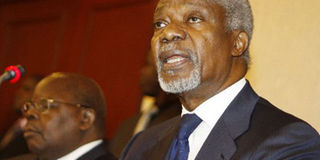Uhuru, Ruto should not have been free during ICC trial - Annan

Former Secretary-General Kofi Annan during a press conference in Nairobi on October 11, 2012. In an article published by the UK-based Financial Times, Mr Annan criticised the ICC for not doing enough to protect witnesses from intimidation. PHOTO | NATION MEDIA GROUP
What you need to know:
- Mr Annan oversaw the mediation that led to the formation of a grand coalition government in Kenya after the disputed 2007 presidential election.
Former United Nations Secretary-General Kofi Annan has questioned the decision by the International Criminal Court (ICC) to allow President Uhuru Kenyatta and his deputy, Mr William Ruto, to remain free as their cases proceeded.
In an article published by the UK-based Financial Times, Mr Annan also criticised the court for not doing enough to protect witnesses from intimidation.
“The President and Vice-President were the ones in the dock and so they put lots of effort and resources into fighting the case,” Mr Annan said.
The ICC has a detention centre located within a Dutch prison complex in Scheveningen, on the outskirts of The Hague.
Among the suspects detained in the cells in the Netherlands as their cases proceeded are former presidents Charles Taylor (Liberia) and Laurent Gbagbo (Cote d’Ivoire) and a former vice-president of DR Congo, Jean-Pierre Bemba, whose sentencing is to be delivered today.
“I remind the Africans that it is wrong for them to say that only African leaders are put into the dock,” Mr Annan wrote in the Financial Times, adding that they “should not pretend that they were the first” or that the process is biased.
Mr Annan oversaw the mediation that led to the formation of a grand coalition government in Kenya after the disputed 2007 presidential election.
The chaos that erupted after PNU’s Mwai Kibaki was announced the winner by the now defunct Electoral Commission of Kenya led to the investigation and prosecution of six Kenyans, among them President Kenyatta and Mr Ruto.
However, all the cases collapsed due to lack of concrete evidence, with the prosecution, led by Fatou Bensouda, blaming the situation on witness intimidation, bribery and political interference by African leaders.





